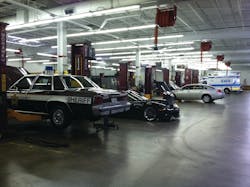Data mining for improved maintenance management
Vehicle mileages, repairs and other maintenance details can be recorded in software or spreadsheet programs, even paper files. Unless fleets have the means to analyze the information, they lack the insights to cut costs, challenge assumptions and adapt to change.
This used to be the case for the Wake County fleet in North Carolina. Wake County is comprised of 12 municipalities and the city of Raleigh. Since 1988, all government departments have been required to lease their vehicles from one source, a division called Wake County Fleet Operations.
Technology is the centerpiece for how Fleet Operations accomplishes its ongoing mission to provide a well-managed, competitive and environmentally responsible fleet to Wake County and its customers.
Most of the 890 assets in the Wake County fleet are light duty vehicles such as SUVs, pickup trucks, vans, ambulances fire engines and motorcycles.
THE MOVE TO DIGITAL
Wake County Fleet Operations offers a "one-stop" shop to customers with lease programs that cover purchasing, licensing and outfitting vehicles with specialty equipment and decaling. Once vehicles are placed into service, Fleet Operations sources the fuel along, with all maintenance and repairs. It also manages the sales and disposal of vehicles after the lease ends.
In 2003, Wake County brought automation and analysis to the forefront of managing this large and diverse operation. It replaced its "dinosaur" software program that was mainly used to capture information and print paper for its vehicle files, says Thomas Kuryla, fleet director.
It implemented its new fleet management system, TMW System's TMT Fleet Maintenance, in less than one week. The biggest challenge was getting technicians used to a new computer workstation, but the problem was resolved within three days through hands-on training.
"It has been really easy for them to learn," Kuryla adds.
A year later, the fleet began using the system's automated alerts system to schedule preventive maintenance (PM) based on total miles driven. In the past, Fleet Operations' service manager had to run a report to find vehicles that were due for service. The manager then had to call drivers to arrange a time to bring vehicles in.
The TMT Fleet Maintenance system sends out weekly e-mails to drivers of vehicles due for service. Between 1,500 and 2,000 drivers use vehicles leased by Fleet Operations. The message requests that drivers contact the service manager to schedule an appointment.
Since using the automated reminder, Fleet Operations has maintained a 90 to 95 percent PM compliance. Prior to system installation, PM compliance was 73 percent.
By integrating TMT Fleet Maintenance with the Wake County's three in-house fuel sites, the fleet has also automated the tracking of fuel usage and mileage.
DRIVEN BY ANALYSIS
Fleet Operations uses its TMT database daily to run reports to assist departments as they plan budgets and adapt to daily changes. The sheriff department, for instance, might call to ask the cost per year of its Crown Victoria fleet of patrol cars or the total miles its fleet traveled during the last 7 months versus the last 12.
"The biggest benefit is to pull data out and give it to someone to answer questions they have," says Kuryla. "We can quickly serve up reports to departments."
The system is "especially useful" for internal needs, such as to analyze the cost benefits of different equipment, he adds. As new models come out, Fleet Operations can quickly compare the new features, such as improved fuel economy, to vehicles in its fleet.
A recent analysis showed that the Jeep Liberty four-wheel-drive utility vehicle was no longer its best option. The fleet had been buying this vehicle during the past year and a half. Buying a more fuel-efficient model would cost $1,500 more but would save the fleet $1,000 per year.
"Now we are not buying the vehicle anymore," he says. Without the analysis, "the county would have always bought the cheaper vehicle."
Before using TMT Fleet Maintenance system, Fleet Operations would determine its vehicle lifecycles and lease rates using industry information. It has since created its own rating system for vehicles based on age, purchase price, the service they perform, fuel and maintenance costs, resale value and other areas. The rating system is managed separately using a custom Crystal Report that pulls data automatically from the TMT database.
"Some databases are not easy to use with another software system like Crystal Reports," notes Kuryla.
Four years ago when the economy was in a free fall and budgets were tight, Fleet Operations was able to use data analysis to extend its trade cycles and decrease lease rates for customers by $1.5 million.
A more recent example is the Honda Civic hybrid. Based on industry data, the vehicle has a five-year lifecycle. In the past year, the fleet made the decision to increase the lifecycle to six years. Similarly, the Crown Victoria has an industry three-year lifecycle. Wake County offers a four-year lease to lower costs for customers.
"We determine lease rates based on actual data versus market data," he says. "We felt we did things better and made things last longer. We couldn't do it without TMT to pull data out."
MORE EFFICIENCY
Managing labor and other shop resources is another area where the system continues to provide useful analysis. The Wake County fleet is maintained in one shop by a staff of 14, including seven full-time and one part-time technicians. The fleet's vehicle-to-mechanic ratio is 120:1, far greater than the standard ratio across the country of 55:1.
The TMT fleet maintenance solution's electronic parts workstation has improved shop communications and simplified the process of supplying parts and assigning them to repair orders. Fleet Operations' $130,000 in parts inventory is tracked with 98+ percent accuracy to parts-on-hand, according to Kuryla.
Before the system was implemented, the fleet had virtually no warranty recovery. The system automatically identifies and documents repairs covered by warranty. Wake County averages $12,000 per year in claims and has approval from OEMs to handle warranty repairs in house.
In addition to servicing its own vehicles, Fleet Operations works on vehicles owned by outside agencies such as the U.S. Marshall and community colleges. The fleet invoices these customers directly from TMT. Revenue from outside agencies averages $90,000 per year.
HELP ADAPTING TO CHANGE
Currently, the fleet is going through a budget process for the upcoming year. As part of this process, the fleet is able to justify additional costs, such as hiring another technician, by showing the impact this would have on service times and other areas that are important to customers.
Within minutes, Fleet Operations can run a report that shows the impact on its workload if the EMS department wanted to add another ambulance or if the sheriff were to add five patrol cars.
Currently, ambulances are only four percent of the fleet but account over 20 percent of the repairs and 10 percent of labor time. One ambulance is the equivalent of five cars in terms of staffing needs.
In general, the maintenance database has become an invaluable tool for Fleet Operations to quickly adapt its services to the needs of each individual group in the organization, Kuryla says. "As time goes on, those needs change. If we have the same goals we can go farther, faster."
About the Author

